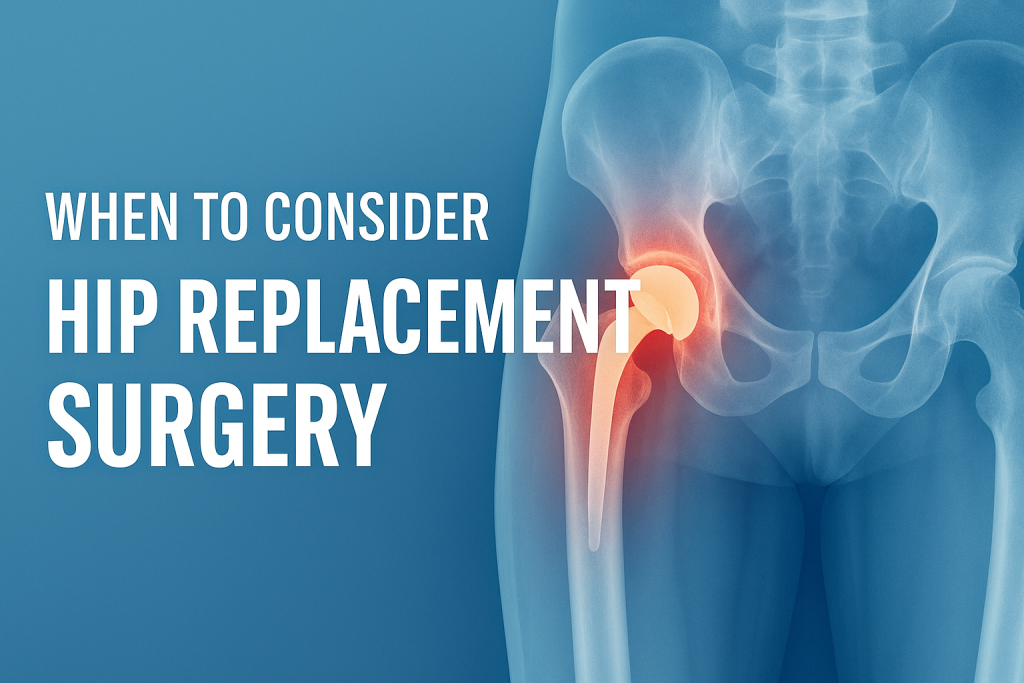
When to Consider Hip Replacement Surgery: A Complete Guide
By Dr. Sunny Chopra in Orthopaedics & Joint Replacement
Jul 7, 2025
Hip pain is more than a minor inconvenience—it can significantly impair your ability to walk, sleep, and carry out daily activities. When conservative treatments like medications, physiotherapy, or lifestyle modifications no longer provide relief, it might be time to consider a more permanent solution. Hip replacement surgery is one of the most effective procedures for restoring mobility and eliminating chronic hip pain. How do you know when hip replacement surgery is the right option for you?
This article offers a comprehensive guide to help you understand when to consider hip replacement surgery, what it involves, and how it can change your life for the better.
Also Read: Benefits Of Knee Replacement Surgery
What is Hip Replacement Surgery?
Hip replacement surgery, also called total hip arthroplasty, involves replacing a worn-out or damaged hip joint with a prosthetic implant to restore function and relieve pain.The procedure is intended to alleviate pain, improve joint function, and significantly boost the quality of life in patients with serious joint disorders.
The procedure entails removing the damaged bone and cartilage from the hip joint and replacing them with prosthetic components made of metal, ceramic, or high-grade plastic. The result is a smoother, pain-free joint that allows for improved movement and function.
Also Read: What Happens When You Dislocate Your Elbow?
Common Reasons for Hip Replacement Surgery
Many conditions can lead to hip joint damage. Hip replacement surgery is most often recommended for the following conditions:
- Osteoarthritis: Age-related “wear and tear” of the hip joint that causes pain, stiffness, and limited motion.
- Rheumatoid Arthritis: An autoimmune disease that leads to joint inflammation and deterioration.
- Post-Traumatic Arthritis: Joint damage following a serious injury or fracture.
- Avascular necrosis is a condition characterized by reduced blood flow to the hip bone, which can result in the weakening & eventual collapse of the bone.
- Hip Fractures: Especially common in older adults, fractures may not heal properly and require surgical intervention.
- Congenital Hip Disorders: Abnormalities present from birth that worsen over time and impair joint function.
Also Read: Knee Replacement
Signs You May Need Hip Replacement Surgery
Here are clear signs that it’s time to consider hip replacement surgery:
1. Persistent Pain
If your hip pain continues even at rest, interferes with sleep, or makes everyday tasks like walking, climbing stairs, or rising from a chair difficult, it may be time to consider further evaluation.
2. Limited Range of Motion
If your hip joint feels stiff or your range of motion has significantly reduced, and it affects your ability to perform everyday tasks, surgical intervention may be necessary.
3. Ineffective Non-Surgical Treatments
When medications, physical therapy, walking aids, or lifestyle changes no longer provide adequate relief, it’s time to explore surgical options.
4. Emotional and Mental Impact
Chronic hip pain can lead to anxiety, depression & social withdrawal. If your hip condition is affecting your mental well-being and overall quality of life, surgery may help restore both physical and emotional health.
5. Changes in Gait or Posture
If you’re limping, putting more weight on one side, or compensating your body movements due to hip pain, this could indicate worsening joint damage that may require hip replacement surgery.
Also Read: Metro Doctor Speak: Joint Replacements
Types of Hip Replacement Surgery
Based on the severity of joint damage and your overall health, your orthopedic surgeon may suggest one of the following treatment options:
- In a total hip replacement, both the rounded head of the thigh bone and the socket of the pelvis are surgically removed and replaced with artificial components designed to restore natural joint function.
- Partial Hip Replacement: Only the femoral head (the ball portion) is replaced, often used in cases of hip fracture.
- Hip Resurfacing: The bone is preserved and reshaped, typically recommended for younger, active patients.
Advancements in surgical techniques, including minimally invasive procedures and robotic-assisted surgery, have significantly improved outcomes and reduced recovery time.
Benefits of Hip Replacement Surgery
Opting for hip replacement surgery can bring life-changing benefits, such as:
- Dramatic pain relief
- Improved mobility and flexibility
- Better sleep and comfort
- Enhanced ability to perform daily tasks
- Boosted mental and emotional well-being
- Reduced reliance on medications and mobility aids
Most patients report a significant improvement in quality of life within weeks after surgery.
Risks and Considerations
While hip replacement surgery is generally safe & effective, like all major surgeries, it carries some risks, including:
- Infection
- Blood clots
- Dislocation
- Leg length discrepancy
- Wear and tear of prosthetic parts over time
It’s important to have a detailed discussion with your surgeon about these risks to make a well-informed treatment decision. In many cases, the benefits far outweigh the risks, especially when chronic pain interferes with your lifestyle.
Recovery and Rehabilitation
Recovery time varies, but most people begin walking with support within a day or two after surgery. A structured physiotherapy program is essential for regaining strength, flexibility, and balance. Full recovery can take 3–6 months, depending on your health, age, and dedication to rehabilitation.
Following your surgeon’s post-operative instructions closely and attending all follow-up visits ensures a smooth and successful recovery from hip replacement surgery.
Is It the Right Time for Hip Replacement?
If you’re unsure whether you’re ready for hip replacement surgery, consult an experienced orthopedic specialist who can assess your condition through physical exams, imaging tests, and medical history. A proper evaluation will help determine if surgery is the best course of action—or if other treatments can still offer relief.
Conclusion
Hip replacement surgery offers a proven and effective treatment for individuals experiencing persistent hip pain and limited mobility. When conservative treatments fail to provide relief and your quality of life is compromised, it may be time to consider this life-enhancing procedure.
With the right guidance, preparation, and rehabilitation, you can regain your mobility, independence, and the ability to live a pain-free, active life.







